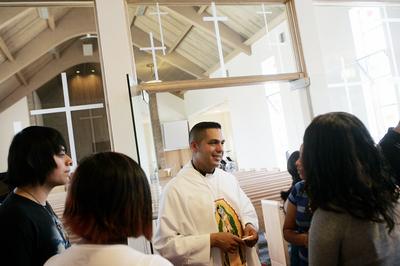 The gentleman pictured above is — drumroll please — a Lutheran minister. And he’s part of a thriving ministry to Hispanics, many of whom are formerly Catholic.
The gentleman pictured above is — drumroll please — a Lutheran minister. And he’s part of a thriving ministry to Hispanics, many of whom are formerly Catholic.
Details, from The Milwaukee Journal-Sentinel:
The Rev. Jhon Freddy Correa pours blessed water over the heads of a squalling toddler and an angelic little girl, gathered with their families on this Sunday at Emmaus Lutheran Church in Racine.
He gently wipes their faces with a cloth and blesses them, saying “Yo te bautizo en el nombre del Padre y del Hijo y del Espiritu Santo” – “I baptize you in the name of the Father, and of the Son and of the Holy Spirit.”
These are the newest members of Emmaus’ Latino ministry, which reflects the growing number of ELCA churches devoted to Latinos.
A Colombian-born former priest in the Old Roman Catholic Church, Correa has been holding weekly services at Emmaus for a year, drawing 150 to 250 worshippers a Sunday in recent months.
“It’s a very vibrant Latino community,” said Correa, whose members are primarily from Mexico. “I’m excited to see the community respond in this way.”Emmaus and a satellite congregation out of Atonement Lutheran Church in Racine are among 41 new congregations approved this year by the Evangelical Lutheran Church in America.
Atonement’s impetus was geographic; an effort to reach out to the growing western suburbs of Racine. But most of the new churches, including Emmaus, formed to serve immigrant populations from Latin America, Asia and elsewhere.
They are a reflection of the ELCA’s renewed commitment to reach out to immigrants and to better reflect the often-changing neighborhoods that surround its churches.
[snip] At Emmaus, many of the members are former Roman Catholics and the previously unchurched, drawn by the youthful enthusiasm of the 28-year-old Correa and Emmaus’ emphasis on children and families.
Many members call him “padre” instead of “pastor.” The Sunday service in many ways resembles the Catholic Mass, though some elements such as incense and the presentation of the Eucharist can be found in the Lutheran high liturgy.
“I explain that we are not Roman Catholic, but we cannot deny our Catholic origins,” Correa said. “I tell them that we are catholic in the universal sense.”
The distinction doesn’t appear to bother members.
“I believe in God, not a church,” Manuel Gallardo, one of the congregation’s leaders, said in Spanish through an interpreter.
Check out the rest at the link.
